This article discusses how to have a successful startup studio.
Because it’s one thing to set up a start studio, which is already challenging enough.
Maintaining and scaling it to success is a different beast altogether.
Here, we’ll discuss the tips you must keep in mind with your startup studio. Plus, we’ll feature the best and most successful startup studios for your inspiration.
Find Like-Minded People
Surround yourself with the right people.
You will have better chances of coming up with revolutionary business ideas if you are around people on your level — who think and behave like you.
Here are tips on finding like-minded people:
1. Evaluate and Readjust Your Current Circle
Reflect on the people in your life.
Focus on the business-minded bunch, and propose your idea to build a startup studio.
2. Join LinkedIn Groups
Search for people outside your network with a similar mission.
LinkedIn is a great social network where you can meet professionals and young entrepreneurs.
Plus, you may use its advanced search filter and enter keywords like “startup studio associates” and “work for startup studios.”
3. Attend Events for Startup Studios
Find out a relevant networking event near your area.
Then, show up and meet new friends.
Tell them about your intention of wanting to establish a startup studio.
Acquire Funding
According to Attila Szigeti, author of Startup Studio Playbook, money pours into funding startup studios if done right.
He says there are always people willing to help startups.
And it’s up to you to show them that you deserve it.
Here are tips on acquiring funding:
1. Submit Realistic Business Plans to Your Network
Create a fool-proof business plan for your operations.
Be detailed and include strategies on how to execute your plan.
Then, show them to interested members of your professional network.
2. Contact Angel Investors and Venture Capital (VC) Firms
Find people with financial resources and take your business plan to them.
Examples of websites where you can find them are Angel Investment Network and FundingPost.
3. Initiate Crowdfunding Campaigns
Create a campaign on Kickstarter or Indiegogo.
Then, lay out your plan.
A pro tip is to solidify your business, then go into as many details as possible.
Gather Startup Ideas
Ideas should always address a problem.
So, the process of gathering startup ideas is observing and finding problems.
Here are tips on gathering startup ideas:
1. Fix Personal Problems
Focus on a paint point and make it go away.
If it can make your life easier, it can improve other lives, too.
2. Apply Creativity
Extraordinarily use something ordinary.
An example is 3D Printing technology.
If it’s often used only in commercial industries, why not use it to help build residential 3D-printed homes?
Be sure, though, to squeeze logic into the equation.
3. Improve an Acceptable Solution
Develop a better mouse trap and acknowledge existing ideas.
Use them to come up with something the same but better.
Allocate Resources
Allocating your resources with a strategy leads to improved efficiency.
It also eliminates stress and helps how you operate your startup studio.
Here are tips on allocating resources:
1. Understand Your Studio’s Cashflow
Please familiarize yourself with how you receive all your money and where it goes.
It lets you avoid confusion.
It also helps you eliminate confusion.
For example, you can delegate the available money more effectively if your money comes from multiple sources (from an angel investor, a VC firm, and crowdfunding campaigns).
2. Create a Budget
Once you understand your cash flow, make a financial plan.
It’s ideal to be strict about it.
Tell yourself that you cannot spend more than what you laid out in your plan.
3. Align Goals with Budget
Create goals for your startup studio.
Then, align them with your budget.
Ensure you design them in a way that helps you make the most of your budget to support your goals.
Execute Ideas
Go out there and let your ideas run free.
If you feel uncertain about an idea, let them out anyway.
It’s the better alternative to keeping these ideas bottled in.
Here are tips on executing ideas:
1. Talk about Ideas
Go to a trusted individual and run a startup’s ideas by them.
Let them tell you if you are being unreasonable with your idea.
2. Understand the Risks
Every idea can either help you grow or drag you down.
If you let your ideas out, you need to accept the possibility of risks.
Remind yourself, though, that there’s a possibility of a considerable reward, too.
3. Focus on Long-Term Growth
Advise a startup to set aside temporary setbacks and invest their energy for a bigger goal.
Assure them that when running their ideas, they may feel defeated at one point.
But understand that small defeats may sometimes be necessary to achieve big wins.
Test and Validate Ideas in the Market
A startup’s idea may be good for you (and your trusted friend).
But it may be a bad idea when it hits the market.
So, before you go out there, test and validate it beforehand.
Here are tips on testing and validating market ideas:
1. Assess the Market Size
A startup’s product may be good for the market.
But, you need to know how big the market for it is.
Then, determine if it’s reasonable to pursue that idea concerning its market size.
2. Research
Learn about similar ideas in the market.
Determine how the public received them.
If the reception is positive, the idea is marketable.
But, if the reception is hostile, you should reconsider the idea.
3. Conduct Interviews
Find out how people — real people, not based on market research — may respond to the idea.
Understand where they are coming from and adjust as necessary.
Find Traction
If an idea is good enough, it may be a hit with people.
It can be a disruptive business idea.
Before it comes to that point, though, the startup could use your help in promoting it.
Here are tips on finding traction:
1. Work with Influencers
Reach a network of people from a notable brand.
Let them endorse a startup, its idea, and everything about it.
2. Connect with Audiences
Market a startup’s idea to audiences.
Allow them to appreciate the benefits it can bring.
3. Create and Develop Branding
Build plans for a startup to stay relevant.
You may design their appearance and help them associate themselves with something unique.
Initiate a Successful Exit
Help a startup develop an exit strategy.
It lets them take things to another level based on well-informed business decisions.
Here are tips on initiating a successful exit:
1. Decide to Pivot
Change the course of a startup.
If there are industry changes, a startup needs to accommodate them and go a different route.
2. Prepare for Acquisition
Let a startup studio enter a win-win situation.
If they have promising potential, but can be crushed by their competition, they should exit this way.
3. Let It Be Available to the Public
Offer it to people who want to be shareholders.
It can help them raise capital for future activities.
Successful Startup Studio Examples
Atomic

Atomic is the brainchild of a serial entrepreneur, Jack Abraham (eBay acquired his company Milo for $75 million in 2010).
It launched in San Fransisco in 2012 with financial backing from popular billionaires and venture capitalists like Peter Thiel and Marc Andreessen.
It’s the venture studio that tested hundreds of ideas and helped set the wheels in motion.
Facts about Atomic:
- Of all startup studios, it’s one of the fastest-moving teams and has already helped 14 startups in 12 months
- It launched many promising companies like Homebound (a tech-enabled home builder), Playbook (a revolutionary investment service), and RayDiant (a developer of in-store digital signage)
- Its most significant success was telehealth startup Hems & Hers (a company Google acquired in 2019 for $1.6 billion)
- It focuses on developing technologies, processes, teams, expertise, and more
- After it comes up with ideas, it finds people to build them
- Its core team streamlines the test distribution, economics, and scalability of new ideas as soon as possible — and ideally, before writing any code.
Betaworks
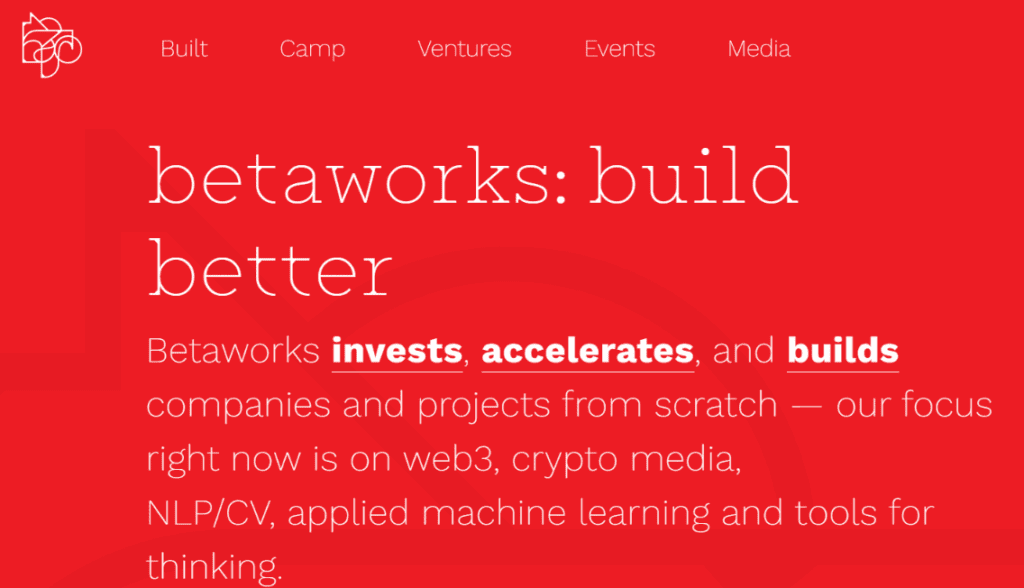
Betaworks began in New York back in 2008. Its founders are former Time Warner executive John Borthwick and former AOL executive Andy Weismann.
Its beginnings explored the startup studio industry with a generalized approach.
But, in 2012, when Weismann left to join a new company, venture capital firm Union Square Ventures, it reshifted its approach.
By then, it focused on company building.
Facts about Betaworks:
- Its portfolio companies include famous names like Twitter, Tumblr, Kickstarter, and Medium
- It helped create Giphy (an animation platform), Bitly (a URL shortener), and Dots (a mobile gaming studio)
- It launched Betalab in 2020. Betalab is a project designed to fund startups that improve the internet
- It incubates projects inside the company and brings in “entrepreneurs in residence.”
- It also runs camps, the three-month in-residence program of the startup studio
- It is where founders work on a project within a particular vertical
Devland

Devland is a startup studio based in San Francisco with Devon Fanfair and Miles Dotson on its founding team.
Since its day-to-day operations began in 2016, it earned a praiseworthy reputation in the world of startup studios.
Facts about Devland:
- It saw its genesis in the early days as part of Silicon Valley, the original technology incubator.
- Its entire portfolio is impressive, and it welcomes everyone with promising ideas. But, it prefers the underdogs (or startup founders with underestimated entrepreneurial talent).
- It features a quick validation process to determine to-be successful market ideas.
- It invests in companies from different sources, program channels, and direct submissions.
- It combines innovative solutions and approaches to technology with an entrepreneurial spirit to build compelling new business models.
- Many entrepreneurs approach Devland because they offer high-end software engineering services.
- They can also simplify complex problems, making it easier to attract investors and forge successful markets.
- Their technology scope includes artificial intelligence, machine communication systems, robotics, and aviation systems.
Expa
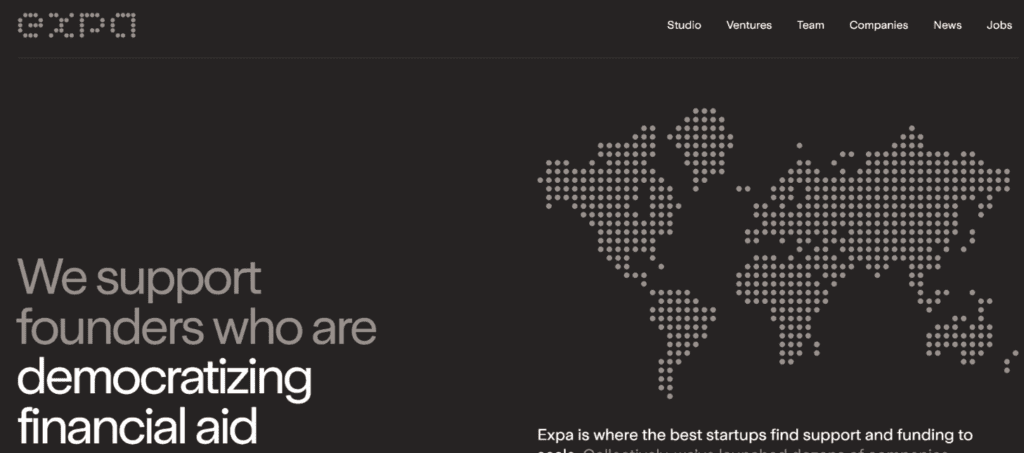
Expa is the brainchild of Garret Camp, one of Uber’s co-founders.
It began operations in 2013 in San Francisco and ran as a community of builders.
Facts about Expa:
- It spins out its ideas (and the ideas of other founders) with a three-pronged strategic approach: (1) build its own companies, (2) advise founders for equity, and (3) invest in new companies.
- Vitor Lourenco, one of its core team members, lauds the Expa team for its commitment to building things.
- It works with a slow and steady approach and focuses on a few projects at a time.
- Investors acquired six of its portfolio companies.
- One of its most significant accomplishments is a company Gitalytics (an analytics platform for engineering teams).
High Alpha
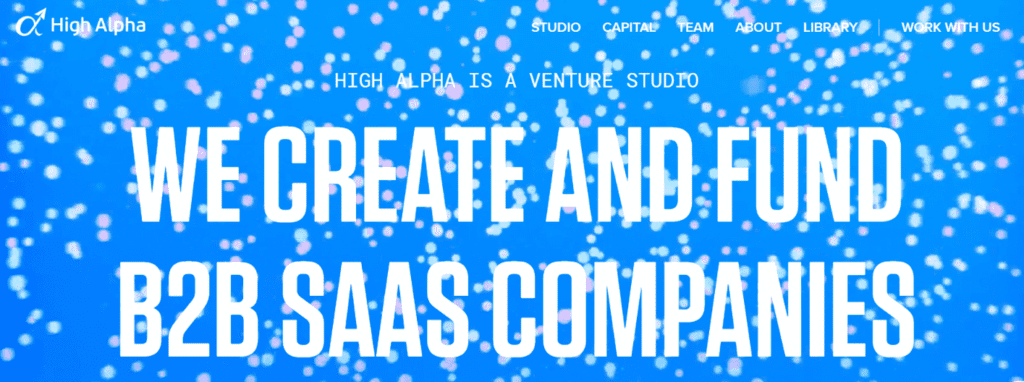
The founding members of High Alpha (High Alpha Studio and Capital) are former ExactTarget executives like Eric Tobias, Kristian Andersen, Mike Fitzgerald, and Scott Dorsey.
From its beginnings in Indianapolis in 2015, it emerged as one of today’s most brilliant startup studios.
Facts about High Alpha:
- It began High Alpha Innovation, an initiative that lets startup studios work with large companies.
- A quarterly event called Sprint Week bedazzles the team in the High Alpha studio. Sprint Week is a four-day event where employees compete against each other to determine the next business idea to develop.
- It spun out over 20 companies, including ClearSccholar, a student engagement platform, and Octiv, a document generation platform.
HVF Labs
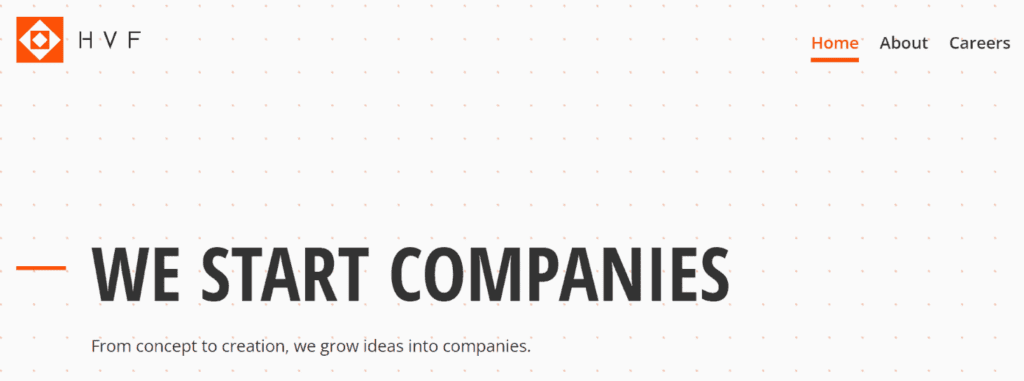
The founder of HVF Labs, a play on the description of its company culture: Hard Valuable Fun, is Max Lechin of Paypal.
Since it launched in 2011, it disrupted the startup world by offering a longer time horizon for startups — differentiating its offering from the typical timeframe that startup studios give to startups is four years.
Facts about HVF Labs:
- Its focus is on using data as leverage and creating value using that leverage.
- It has a reputation for funding startups with in-depth market research processes.
- One of its portfolio companies is Affirm; a financial technology company featured on the NASDAQ.
Pioneer Square Labs
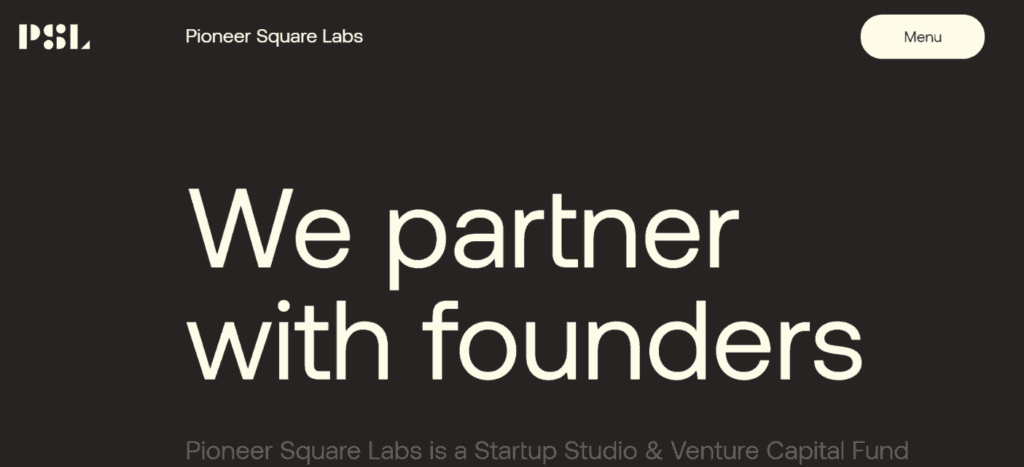
Pioneer Square Labs is both a startup studio and a VC fund.
Mike Galgon, Geoff Entress, Ben Gilbert, and Greg Gottesman are behind its establishment in Seattle in 2015.
Facts about Pioneer Square Labs:
- Ben Gilbert runs Acquired, a popular podcast in the VC and tech spheres.
- Its founders believe that many promising startups need more financial funding and other opportunities to scale.
- When it creates a company, it follows a five-step process — either on its own or as part of a partnership.
- It has strict processes and kills 90% of ideas throughout the ideation, validation, creation, spinout, and scale-up stages.
- A notable incident was in 2020 when it picked a business idea out of a whopping 250 in total.
Rocket Internet
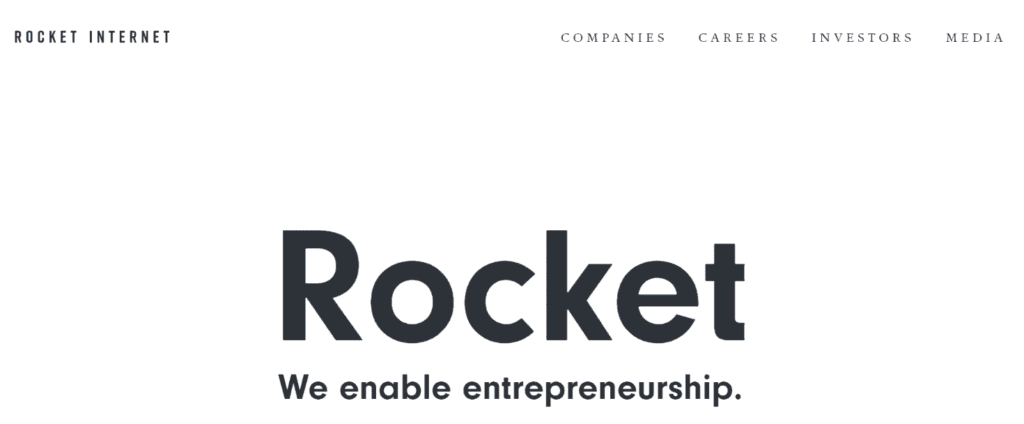
Rocket Internet is the idea of Marc, Alexander, and Oliver Samwer — the brothers who created a German Facebook and sold it to a VC for €85 million in 2007.
The trio dedicated its time to Rocket Internet for one straightforward reason: to build internet companies worldwide.
Facts about Rocket Internet:
- Its business model revolves around cloning successful startups and large companies for other markets
- Its founding team believes if you only dream big enough, you can be like American and Chinese entrepreneurs
- It plans to scale the internet companies it built
- When stock for Rocket Internet was first featured on the Frankfurt Stock Exchange, it had a €6.7 billion market valuation.
- It launched over 200 startups, including HelloFresh (a meal kit service) and Zalando (a German fashion company)
- It’s one of the best representations of a startup factory because it has industrialized processes. Because of this, many people compare it to Ford Motors in how it improves business processes.
Science Inc

Science Inc is a startup studio based in Los Angeles. It is the result of futuristic thinking from Tom Dare, Greg Gilman, Peter Pham, Mike Macadaan, and Michael Jones.
And it addresses a man’s need for personal care and grooming products.
Facts about Science Inc:
- It spun out over 75 companies with a value of $1.3 billion
- Its most successful company is Unilever-acquired Dollar Shave Club (a company that delivers razors and grooming products by mail)
- Science Inc.’s founders also saw an early opportunity in the blockchain. And like other great minds, they capitalized on an opportunity.
- The startup studio has a headquarters in Bangalore. And there, a large team runs it — focusing on select e-commerce investments, mobile, and marketplaces.
Wilbur Labs
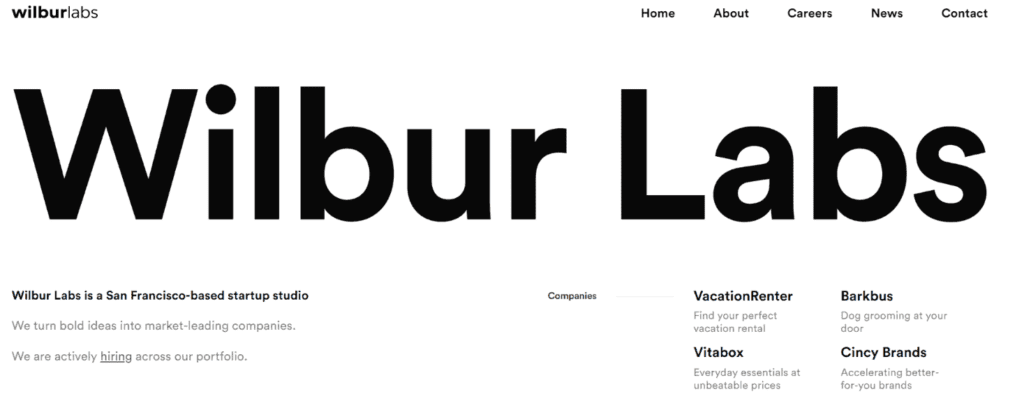
David Kolodny and Phil Santoro founded Wilbur Labs in San Francisco in 2016.
It has a research-based approach and a headquarters for innovative ideas.
Facts about Wilbur Labs:
- It wants to support startups whose founders need a little push forward
- It relies on bold ideas. Then, it helps the ideas turn into brilliant companies with enough capital, shared resources, and supportive communities.
- It has a reputation as one of the pillars of Silicon Valley
Conclusion
As you can tell from this article, knowing how to have a successful startup studio requires planning and strategy.
But, by following the tips above, you can formulate a strategy to help you reach the success you deserve.
If you’re still unsure if the startup studio model is a sound business model, read this post. Learn what it means, its differences compared to startup incubator vs. startup accelerator, and more.

